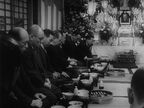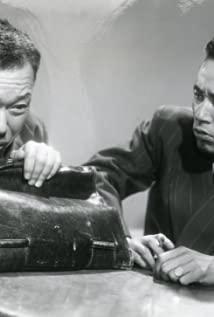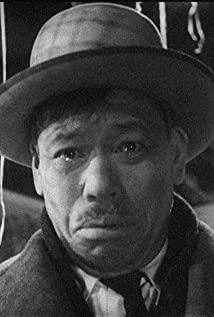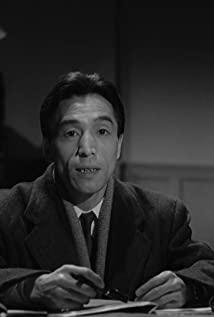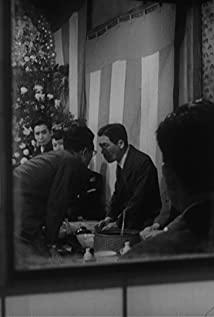When we mention Akira Kurosawa, the first thing we will think of may be his "Rashomon" full of lies and human ugliness, or we will think of his epic "Seven Samurai" . In fact, Akira Kurosawa's films often have a glimpse of the scene in the deep and peaceful lens, which is our common plot reversal.
The bland plot and monotonous light and shadow have been pieced together into a movie that can touch our hearts. What Kurosawa wants to show us directly in "Desire to Live" is just a psychological process of an old man who is about to retire after serving for more than 30 years and suddenly realizes that he is terminally ill. In short, this is a film and television work about life and death. Asian cultures have always tabooed death, but it seems that every statement about life and death in our culture presents a transformational pattern of being first contradicted, then forgotten, and finally worshipped.
In fact, the starting point of all truly philosophical thinking is the thinking about death.
Imagine that you have achieved success and fame, and the year of listening has passed, and you are suddenly told that your deadline is approaching, and there is only less than a year. How will you spend it?
This is a seemingly simple but extremely difficult question. As bystanders, we may give one novel and wonderful answer after another: to travel, to spend our savings and have fun...and if We are unfortunately the one in the authorities. Just imagine, how many people can still plan the rest of their lives so calmly in the face of death within reach? Life is full of paradoxes. The living do not know the worries of death, but the deceased often think of the desire to live.
Let's take a look at the performance of the terminally ill old man in the movie in the face of death? The dull eyes and tears filled his eyes, what kind of unwillingness and despair it revealed: his wife had already passed away, and his only son was estranged from him. The plot continues to develop, and the sudden death completely disrupts the old man's life. He no longer goes to work in the unit, but he has piles of money in his hand but doesn't know how to spend it. He wanders the streets all day long and goes to pubs. Is he happy? Take a look at the old man's self-report in front of the energetic girl. He said that he envied the girl's vigorous vitality, and the vigor that symbolized beauty and dreams that flourished from the body has now become the most wanted thing for the old man. . But helpless, there is only one life. No matter how much we are attached to the beauty of life, one day we still have to say goodbye to life.
Life is meaningless. This is an all too clear truth. No matter how good or bad we are in our lifetimes, we all have to go to the same destination in the end. Those who advocate making their lives better through struggle are just another tragic Don Quixote. The difference is that Don Quixote, the so-called Ranger, treats the turning windmill as an imaginary enemy, and we treat the unknown death as an imaginary enemy; the same is that we are all fighting in vain. And in the end, Don Quixote died of illness, repented, stopped reading knight novels and made a suicide note to prevent those who had read knight novels from marrying his niece, and what about us? If you had the chance, what would you say to your descendants when you were dying?
Let's take a look at his own outlook on life expressed by Akira Kurosawa in his "Desire to Live". The terminally ill old man in the film finally found that he could not leave any happiness in the rest of his life after squandering his money for a while. And his next performance is beyond our expectations. He silently returned to his position as section chief, continuing to work as usual, even more energetic.
The film used the "third-party observation" method, which was unique at the time, to show the living conditions of the old man after returning to his post. That is, after the death of the old man, the memory of the old man in the memorial service of the old man is used to construct the scene of the rest of the old man's last less than one year. When the audience watched the film, it seemed that they unnaturally became a witness in the film. The ditch problem was solved. As the section chief, he bowed his head and begged to his leaders and even his subordinates again and again for his work.
In the end, he succeeded. At the memorial service, groups of people came to offer condolences, but this was not the most important thing to him, so what exactly did the old man want? I think that should be the presence. Before his death, even when he was working in pain as a ninja, the pain he experienced was the most relevant testimony of life. After watching this movie, I will never forget the scene when the old man sat alone on the swing on a snowy night and sang "ゴンドラの賢" (literally translated as "The Song of the Phoenix Boat").
"Life is so short, let a girl fall in love. Before the red lips fade, before the enthusiasm becomes cold, no one knows what will happen tomorrow, no one knows what will happen tomorrow..."
This is the old man humming The lyrics of this song, you see, how the old man is nostalgic for this hard-won life. Even if it was a biting cold wind, as long as he was still shaking on this swing, he would have a sense of existence. This is the meaning of life, not to gain anything, nor to protect anything, but to truly feel the sense of existence at the moment of existence. An undisclosed life should be completely abandoned by us.
In his novel The Magic Mountain, Thomas Mann described for me a microcosm of a group of sentient beings trapped in a sanatorium called Magic Mountain because of tuberculosis. The Magic Mountain has extremely rich symbolic meanings. Those who have never come to the Magic Mountain want to go in by all means, and those who have come to the Magic Mountain also want to go out by all means at first, but after a period of time, even if these patients suffer from tuberculosis It has improved, but he still has to do everything possible to stay in the Magic Mountain. You ask why? Because they are used to the life of the magic mountain, they are afraid of change. For them, the life on the mountain is full of variables, but the life on the mountain is eternal and unchanging.
The reason why this book is mentioned at the end is because you don't think life and death are equivalent to the magic mountain? Trapped in life and death, we no longer have the courage to face this proposition. We choose to live a life of ignorance and confusion, but do not understand. The rest means nothing to us. There is no single answer about life and death.
The meaning of life is not gain and loss, but the life and death we feel between gain and loss.
View more about Ikiru reviews




